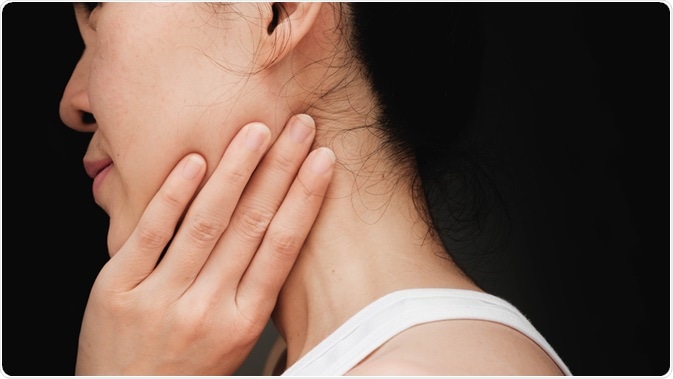Xerostomia is a common condition whereby patients complain of a persistent dry mouth due to insufficient saliva production. Xerostomia is caused by a number of medical and lifestyle-related issues that can result in either temporary or permanent cessation of saliva production by the salivary glands.
 Image Credit: ANN PATCHANAN / Shutterstock.com
Image Credit: ANN PATCHANAN / Shutterstock.com
Medication-caused xerostomia
One of the leading causes of xerostomia is the use of medication. Medications that result in decreased saliva production are termed xerogenic. To date, over 1110 over-the-counter and doctor-prescribed medications list dry mouth as one of their side effects.
Medications can affect saliva production to differing degrees, with some medications producing a more robust feeling of mouth dryness than others. People taking multiple medications are more likely to experience xerostomia than those patients only taking a single medication. Drug classes commonly associated with xerostomia include antihistamines, decongestants, antidepressants, antipsychotics, medications for Parkinson’s disease, skeletal muscle relaxers, antidiarrheals, and many others.
In some cases, a change in drug type, drug dose, or time of drug delivery can alleviate the symptoms. In other cases, taking a liquid (versus tablet) form of a drug or increasing water intake can improve associated xerostomia. Medication-induced xerostomia is usually temporary.
The incidence of xerostomia increases with age. However, it is unclear whether age is a direct cause of xerostomia or if the association is due to the increased number of medications taken by the elderly.
Diseases causing xerostomia
Xerostomia is also a symptom in many medical conditions. Several immune disorders are associated with dry mouth. For example, Sjögren’s syndrome is an immune disease typically found in post-menopausal women whereby immune cells attack and enlarge the salivary and lacrimal glands that produce saliva and tears, respectively. Because of this, patients with Sjögren’s syndrome often experience dry mouths and eyes.
The effects of Sjögren’s syndrome are permanent and symptoms can only be managed. Similarly, some patients infected with HIV experience immune cell infiltration and enlarging of the salivary glands (particularly the parotid gland) that can result in decreased salivary production. This is especially seen in HIV-infected children. Other immune disorders associated with xerostomia include rheumatoid arthritis and systemic lupus.
Several other medical conditions and systemic diseases are also associated with xerostomia. For example, patients with type 1 or type 2 diabetes often complain of xerostomia, which occurs as a result of the dehydration and frequent urination associated with abnormal blood sugar levels.
Other diseases associated with xerostomia include hypertension, cystic fibrosis, end-stage renal disease, and some endocrine disorders. In addition, people who have sustained a severe injury to the head or neck resulting in nerve damage may also experience xerostomia, as the nerve response to initiate salivary production is destroyed.
Xerostomia is also commonly found in patients receiving therapy for cancers of the head and neck. Several chemotherapeutic agents can temporarily dampen saliva production, giving the sensation of dry mouth. Patients who undergo radiation treatment for cancer may have permanent loss of salivary function, as the radiation itself creates a buildup of fibrous tissue within the salivary glands that prevent appropriate secretion. After radiation treatment, patients often report their saliva to be thick and of a mucous-like consistency.
Learn about Xerostomia in 5 minutes ..!! | Dry Mouth |
Lifestyle for individuals with xerostomia
Although less common, xerostomia can also be caused by lifestyle choices. Consumption of alcohol, drug use, and smoking can result in a dry mouth. Patients are usually advised to refrain from such behaviors if xerostomia is diagnosed.
Similarly, mouth breathing or back sleeping that leads to nasal obstructions and irregular breathing patterns throughout the night are sometimes found to be underlying causes of xerostomia.
References
Further Reading
Last Updated: Mar 31, 2023